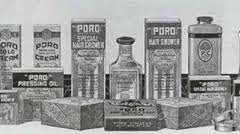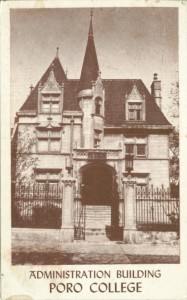
Good Morning POU!
Today we look at hair maven Annie Turnbo Malone, the woman who taught Madame CJ Walker.
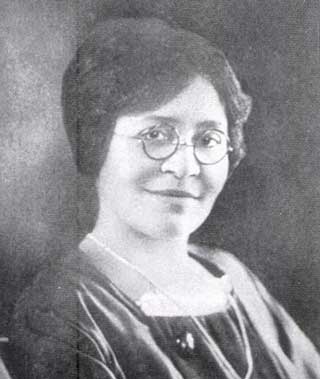
Annie Minerva Turnbo was born in southern Illinois, the daughter of escaped slaves Robert and Isabella (Cook) Turnbo. While her father went off to fight for the Union troops in the Civil War, her mother had taken their children and escaped from Kentucky , a neutral border state that maintained slavery. After traveling down the Ohio River, she found refuge in Metropolis, IL. There Annie Turnbo was later born, the 10th of 11 children.
Annie was born on a farm in Metropolis, where she lived with her siblings until their parents died. Orphaned at a young age, Annie attended a public school in Metropolis before moving to Peoria to live with an older sister. In Peoria, Annie attended high school. She took a great interest in chemistry; however, due to frequent illness, Annie was forced to withdraw from classes.
While out of school, Annie grew so fascinated with hair and hair care that she often practiced hairdressing with her sister. Through her interests in chemistry and hair care, Turnbo began to develop her own hair care products. At the time, many women used goose fat, heavy oils, soap or other harsh products to straighten their curls, which damaged both scalp and hair.
By the beginning of the 1900s, Turnbo moved with older siblings to Lovejoy, now known as Brooklyn, IL. While experimenting with hair and different hair care products, she developed and manufactured her own line of non-damaging hair straighteners, special oils, and hair-stimulant products for African-American women. She named her new product “Wonderful Hair Grower” To promote her new product, Turnbo sold the Wonderful Hair Grower in bottles from door-to-door. She began to revolutionize hair care methods for all African Americans.

In 1902 Turnbo moved to a thriving St. Louis, where she and three hired assistants sold her hair care products from door-to-door. As part of her marketing, she gave away free treatments to attract more customers. In 1903 she briefly married a Mr. Pope but soon divorced him when he tried to interfere in her growing business.
Due to the high demand for her product in St. Louis, in 1904 Turnbo opened her first shop on 2223 Market Street. She also launched a wide advertising campaign in the black press, held news conferences, toured many southern states, and recruited many women whom she trained to sell her products.
One of her selling agents, Sarah Breedlove (who became known as Madam C. J. Walker when she set up her own business), encouraged Turnbo to copyright her products under the name “Poro” because of what she called fraudulent imitations and to discourage counterfeit versions. Poro is a West African word meaning physical and spiritual growth. Due to the growth in her business, in 1910 Turnbo moved to a larger facility on 3100 Pine Street.
On April 28, 1914, Annie Turnbo married Aaron Eugene Malone, a former teacher and bible salesman.
Turnbo Malone, by then worth well over a million dollars, built a five-story multipurpose facility. In addition to a manufacturing plant, it contained facilities for a beauty college, which she named Poro College. The building included a manufacturing plant, a retail store where Poro products were sold, business offices, a 500-seat auditorium, dining and meeting rooms, a roof garden, dormitory, gymnasium, bakery, and chapel. It served the African-American community as a center for religious and social functions.
The College’s curriculum addressed the whole student; students were coached on personal style for work: on walking, talking, and a style of dress designed to maintain a solid persona. Poro College employed nearly 200 people in St. Louis. Through its school and franchise businesses, the college created jobs for almost 75,000 women in North and South America, Africa and the Philippines.
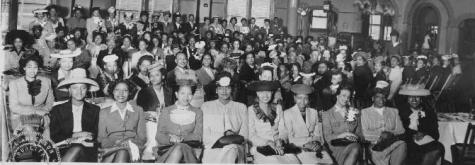
By the 1920s, Annie Turnbo Malone had become a multi-millionaire. In 1924 she paid income tax of nearly $40,000, reportedly the highest in Missouri. While extremely wealthy, Malone lived modestly, giving thousands of dollars to the local black YMCA and the Howard University College of Medicine in Washington, DC. She also donated money to the St. Louis Colored Orphans Home, where she served as president on the board of directors from 1919 to 1943. With her help, in 1922 it bought a facility at 2612 Goode Avenue (which was renamed Annie Malone Drive in her honor).
The Orphans Home is still located in the historic Ville neighborhood. Upgraded and expanded, the facility was renamed in the entrepreneur’s honor as the Annie Malone Children and Family Service Center. As well as funding many programs, Malone ensured that her employees, mostly black, were paid well and given opportunities for advancement.
Her business thrived until 1927, when her husband filed for divorce. Having served as president of the company, he demanded half of the business’ value, based on his claim that his contributions had been integral to its success. The divorce suit forced Poro College into a court-ordered receivership. With support from her employees and powerful figures such as Mary McLeod Bethune, she negotiated a settlement of $200,000. This affirmed her as the sole owner of Poro College, and the divorce was granted.
After the divorce, Turnbo Malone moved most of her business to Chicago’s South Parkway, where she bought an entire city block. Other lawsuits followed. In 1937, during the Great Depression, a former employee filed suit, also claiming credit for Poro’s success. To raise money for the settlement, Turnbo Malone sold her St. Louis property. Although much reduced in size, her business continued to thrive.
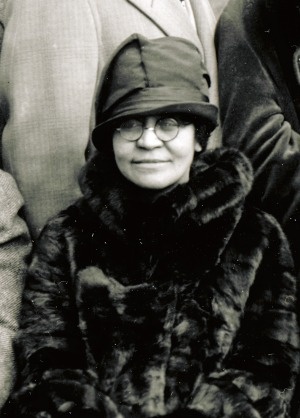
On May 10, 1957, Turnbo Malone suffered a stroke and died at Chicago’s Provident Hospital. Childless, she had bequeathed her business and remaining fortune to her nieces and nephews. At the time of her death, her estate was valued at $100,000 due to her many losses.

